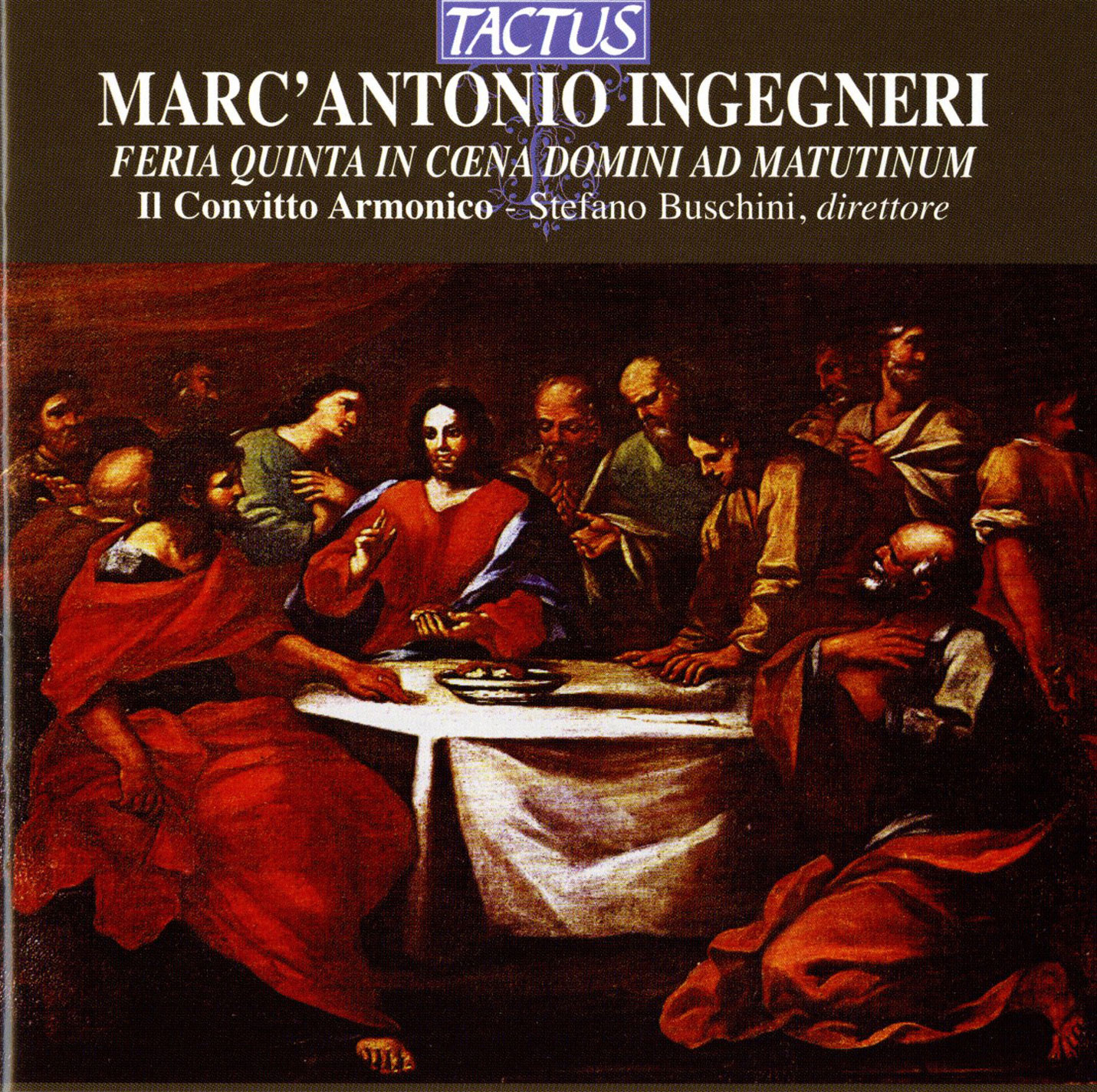INGEGNERI MARC”ANTONIO
Ingegneri should be considered as one of the most open composers to the new aesthetic and stylistic trends of the late 16th century.
It is no coincidence that the theoretician and singer from Bergamo, Pietro Cerone, in his treatise El Melopeo y Maestro (Naples 1613), states that “Pietro Vinci and M.A. Ingegneri are among the first to become noted for the variety of the counterpoint […] being written nowadays in Italy, of which one can almost say that they were the inventors.
And take note that the music governed by such counterpoint does not satisfy everyone, but only those who are professionals, those who know how to judge finely and with acumen, and not by common people.
Nor is it pleasing to the beginning singer, since it does not possess that sweetness and grace which the natural ear desires. Indeed, all of its charm lies in the artifice of the parts, and not in the euphoniousness of the voices; it lies in the combination of the counterpoint and not in the sweetness of the consonances.
Thus its true judge is the capacity of technical comprehension proper to the complete musician, and not the simple ear of just anyone.”
Respecting the decree set down by the Council of Trent, “ut verba intelligerentur”, Ingegneri shows himself to possess a profound knowledge of the ties that bind words and sound, verbal and musical meters, the semantic weight of the word, and the figurative adherence of the contrapuntal line destined to depict it. Ingegneri stood as an equal to Palestrina in his profound knowledge of the spoken and sung language.
For the former, as for his contemporary composers, the intoning of the word cannot be divorced from the accentual and metrical components which comprise it.
From this arises the art of oratory which informs the entire musical expression of the 16th century, the undisputed power of eloquence in art to move the affects.
Ingegneri’s contrapuntal writing constantly leans toward exalting the expressive functions of the word, underlining its semantic valence by means of the intimate adherence of the verbal to the musical sound.
Tracklist
Anonymous
Psalm 69 and Antiphon: Avertantur retrorsum
1 - Psalm 69 and Antiphon: Avertantur retrorsum (2:52)
Ingegneri, Marc'Antonio
Lamentationes Hieremiae
2 - Lamentationes Hieremiae: Lectio Prima: Quomodo sedet sola civitas plena populo (5:12)
Responsoria hebdomadae sanctae
3 - Responsoria hebdomadae sanctae: Responsorium: In monte Oliveti (2:45)
Lamentationes Hieremiae
4 - Lamentationes Hieremiae: Lectio Secunda: Migravit Judas propter afflictionem (4:52)
Responsoria hebdomadae sanctae
5 - Responsoria hebdomadae sanctae: Responsorium: Tristis est anima mea (2:39)
Lamentationes Hieremiae
6 - Lamentationes Hieremiae: Lectio Tertia: Facti sunt hostes eius un capite (5:08)
Responsoria hebdomadae sanctae
7 - Responsoria hebdomadae sanctae: Responsorium: Ecce vidimus eum (4:53)
Anonymous
Psalm 71 and Antiphon: Liberavit Dominus
8 - Psalm 71 and Antiphon: Liberavit Dominus (6:55)
Ingegneri, Marc'Antonio
Responsoria hebdomadae sanctae
9 - Responsoria hebdomadae sanctae: Responsorium: Amicus meus (3:05)
10 - Responsorium: Judas mercator pessimus (1:54)
11 - Responsorium: Unus ex discipulius meis (2:58)
Anonymous
Psalm 75 and Antiphon: Terra tremuit et quievit
12 - Psalm 75 and Antiphon: Terra tremuit et quievit (4:08)
Ingegneri, Marc'Antonio
Responsoria hebdomadae sanctae
13 - Responsorium: Eram quasi Agnus (2:26)
14 - Responsorium: Una hora (2:24)
15 - Responsorium: Seniores populi (3:17)
Not Applicable, na
Strepito (Fragor et strepitusa liquantulum)
16 - Strepito (Fragor et strepitusa liquantulum) (0:26)
Anonymous
Oratio: Respice, quaesumus, Domine
17 - Oratio: Respice, quaesumus, Domine (0:33)
- Composer: INGEGNERI MARC”ANTONIO
- Performers: Il Convitto Armonico – Gruppo vocale (Responsori) Cantus: Lorella Coppa, Chiara Maggi, Alessia Bruschi, Donatella Gnani, Sylva Arrighi, Altus: Eleonora Baroncelli, Daniele Chiappini, Alessandra Nardelli, Daria Malaspina, Tenor: Paolo Mettifogo, Stefano Baldi, Pino La Rocca, Mario Mori, Bassus: Daniele Cecchi, Marco Montanelli, Gaetano Canepa, Federico Canese, Robert Kyburz, Quartetto vocale (Lamentazioni di Geremia) Cantus: Stefano Baldi, Altus: Mario Mori, Tenor: Stefano Buschini, Bassus: Federico Canese, Schola gregoriana – Stefano Baldi, Mario Mori (celebrante), Paolo Mettifogo, Stefano Buschini
- Historical Period: Humanism and Renaissance
- Code: TC 540901
- Edition: 2004
- Barcode: 8007194102710
- Set: 1
- Total tracks: 17
- Total duration: 00:56:26






